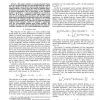Free Online Productivity Tools
i2Speak
i2Symbol
i2OCR
iTex2Img
iWeb2Print
iWeb2Shot
i2Type
iPdf2Split
iPdf2Merge
i2Bopomofo
i2Arabic
i2Style
i2Image
i2PDF
iLatex2Rtf
Sci2ools
142
click to vote
CDC
2010
IEEE
2010
IEEE
On optimal input design in system identification for control
Abstract-- This paper considers a recently proposed framework for experiment design in system identification for control. We will consider model based control design methods, such as Model Predictive Control, where the model is obtained using a prediction error system identification method. The degradation in control performance due to uncertainty in the estimated model is specified by a constrained application cost function. The idea is to find a minimum power input signal, to be used in system identification experiment, such that the control performance specification is guaranteed with a given probability when using the estimated model. The objective is to provide insight in the potentials of this approach by using finite impulse response model examples, where it is possible to analytically solve the corresponding optimal input design problem. The examples show how the control specifications directly affects the excitation conditions in the system identification experiment.
Related Content
| Added | 13 May 2011 |
| Updated | 13 May 2011 |
| Type | Journal |
| Year | 2010 |
| Where | CDC |
| Authors | Bo Wahlberg, Håkan Hjalmarsson, Mariette Annergren |
Comments (0)

